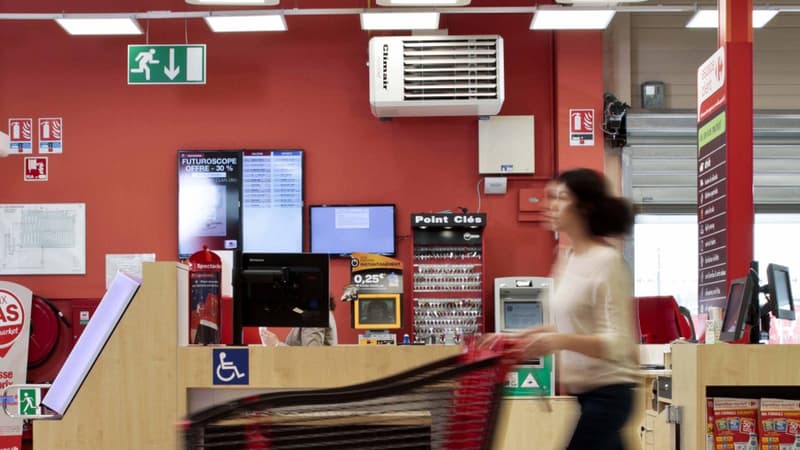A winter with less tension but still necessary to save energy. This is the observation and reminder that members of the government and energy sector actors have been making periodically for several weeks. Citizens are encouraged to renew ecological gestures that contributed to reducing gas and electricity consumption by 12% between August 1, 2022 and July 31 compared to the same period in 2018-2019, according to figures presented by the Minister of Energy Transition, Agnès Pannier. -Runacher.
But in addition to the residential sector, it is especially the tertiary sector that is increasingly called upon to participate in energy efficiency efforts. It must be said that it represents 30% of electricity consumption in winter and could, according to the manager of the electric transport network RTE, achieve “20% savings without enormous efforts” with “a little awareness and technical management.”
“The tertiary sector is in the spotlight because it is complicated and very expensive to change the technical processes of the industrial sector and, at the residential level, it is difficult to force individuals to act,” explains Alric Marc, president and founder of Eficia, specialist in technical building management. For ten years, this company has offered its dozens of client companies energy management solutions for their buildings in order to reduce consumption and therefore their bills.
An automatic lever with AI and a “human” lever
It was when he was working in the photovoltaic installations sector with companies that Alric Marc realized that they had no idea of their level of energy consumption and that he came up with the idea of creating Eficia. The company installs sensors and actuators in its clients’ buildings connected to a centralized system that provides direct information about heating temperatures, the air conditioning system and even the lighting of the facilities.
Thanks to artificial intelligence, automatic “orders” in the form of algorithms can be transmitted to different teams. “But it is also possible to intervene remotely, especially in the event of breakdowns, insists Alric Marc. In reality there are two levers, the automatic one and the ‘human’ one.”
The solution proposed by Eficia allows you to register a reduction in energy consumption from 10 to 40% on a real estate property based on the performance level of the properties, a non-négligeable order of magnitude when reporting on invoices that are particularly grimpé. since two years ago. “COP21 and Covid have raised awareness in CSR departments, which have implemented solutions, says the boss. But the energy crisis has given a real impetus that has raised the issue to financial departments, or even general departments “
Guest on Wednesday’s 90-minute Business program, CEO Julien Bellynck underlines the instability and volatility of energy prices: “Today, energy buyers have great difficulty predicting and anticipating tomorrow’s price. The The first factor is to limit consumption to ‘risk the energy bill’.
20% drop in consumption… and the bill
Today, Eficia manages around 3,000 buildings, the vast majority belonging to large groups, which “are more likely to have significant energy costs”, and which operate in the commercial or logistics sector. Among these companies is Cultura, which equipped its 105 stores, as well as its warehouse and headquarters starting in 2017 to respond to a triple challenge: the environment, energy consumption and customer comfort. “It is difficult to manage everything manually, especially given the numerous regulatory limitations,” estimates Michael Gerbaud, director of the department of works, development, maintenance and energy.
This use of Eficia is part of a global strategy to reduce energy consumption that also includes the transition of lighting to 100% LED. “The technical management of buildings also makes it possible to prioritize investments and check the importance of equipment changes,” says Michael Gerbaud. “When making budget decisions, we can know precisely the potential benefits.”
The same logic applies to the Kingfisher group, whose CSR group Sandrine Lefebvre Rorive was also on the set of 90 Minutes Business on Wednesday. The real estate company of the Castorama and Brico Dépôt brands has thus retired its gas boilers, has been supplied with hydraulic energy since 2020 and is attentive to innovative techniques such as natural cooling (at night) or even reflective paints on the roofs.
Control long-term grid load demand
The technical management of buildings will grow exponentially in the coming months. Following the tertiary decree resulting from the ELAN law that obliges companies to reduce the energy consumption of their buildings by 40% by 2030 with respect to a reference year during the period 2010-2019, the recently updated BACS decree requires that buildings with an area greater than 300 square meters to implement an intelligent control system for their heating, ventilation and air conditioning equipment by 2025 for the existing stock, the law is already in force from 2021 for the new site (s.
Eficia aims to develop its technical building management solution by integrating water and waste management. The company also wants to improve the control of load demand from tertiary buildings on the electricity grid. “On the electricity grid, RTE is having difficulty balancing production and demand,” says Julien Bellynck. The demand for tertiary buildings comes just at the most difficult time for RTE, especially in winter, in the morning, at lunchtime and between 5 and 8 p.m.
In this sense, the second major lever lies in the storage of energy within the building to “be able to practically disconnect it from the network for a few hours to avoid overloading the network, normally between 5 and 7 p.m. in summer or between 8 a.m. am and noon the rest of the year.” “We charge the batteries at night and disconnect the building at peak times,” summarizes the CEO of Eficia. “This is the connected and controlled building of tomorrow and we need local storage solutions.”
Source: BFM TV


